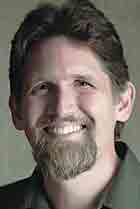Lawrence University anthropologist Peter Peregrine will join a team of Yale University researchers on a project designed to better understand how cultures facing regular but unpredictable natural disasters develop resilient strategies.

Supported by a $1 million grant from the National Science Foundation, the four-year project begins this fall. It will be worldwide in scope and encompass contemporary countries, traditional societies of the recent past and ancient societies in prehistory.
The grant also will provide funding for 2-4 Lawrence students per year to work as research assistants with Peregrine, whose role in the project will focus on ancient societies.
With scientists predicting greater impacts of extreme climate events (droughts, floods), such “hazards” are more likely to create serious social consequences, including famine, displacement and increased violence.
The project will explore how human societies with varying livelihoods and vulnerabilities have responded to and invented solutions to natural hazards and resulting disasters both past and the present. Among the questions the research will look are: how often do events have to occur for humans to plan for them?; do unpredictable hazards lead to different cultural transformations than do more predictable hazards?; and under what conditions are contingency plans overwhelmed in the face of natural hazards that are more severe or more frequent than normal?
“If we’re going to find solutions to lessen the consequences of extreme events, we need to understand the methods humans have developed over decades, centuries or millennia,” said Peregrine. “We assume most societies that have survived for long periods of time did so by employing some resilient solutions, particularly when these types of natural hazards were recurrent.
“This project also will provide valuable opportunities for some of our students to gain hands-on training in interdisciplinary comparative research,” Peregrine added.
An archaeologist specializing in the evolution of complex societies, Peregrine joined the Lawrence faculty in 1995. He was elected in 2011 a Fellow of the prestigious American Association for the Advancement of Science, which recognizes “meritorious efforts to advance science or its applications,” becoming just the second Lawrence faculty member elected an AAAS Fellow.
He is a member of the External Faculty of the Santa Fe Institute, an accomplished group of scholars that includes a Nobel Laureate, numerous National Academy members and two Pulitzer Prize winning authors.
The author of numerous books and scholarly articles, Peregrine was a 2012 recipient of Lawrence’s Award for Excellence in Scholarship, which honors a faculty member who has demonstrated sustained scholarly excellence for a number of years and whose work exemplifies the ideals of the teacher-scholar.
About Lawrence University
Founded in 1847, Lawrence University uniquely integrates a college of liberal arts and sciences with a nationally recognized conservatory of music, both devoted exclusively to undergraduate education. It was selected for inclusion in the Fiske Guide to Colleges 2015 and the book “Colleges That Change Lives: 40 Schools That Will Change the Way You Think About College.” Individualized learning, the development of multiple interests and community engagement are central to the Lawrence experience. Lawrence draws its 1,500 students from nearly every state and more than 50 countries.